
Filter News
Area of Research
News Type
News Topics
- (-) Energy Storage (26)
- (-) Grid (14)
- (-) Machine Learning (8)
- (-) Quantum Science (12)
- (-) Transportation (26)
- 3-D Printing/Advanced Manufacturing (28)
- Advanced Reactors (3)
- Artificial Intelligence (23)
- Big Data (17)
- Bioenergy (13)
- Biology (9)
- Biomedical (10)
- Biotechnology (2)
- Buildings (15)
- Chemical Sciences (9)
- Clean Water (5)
- Composites (3)
- Computer Science (51)
- Coronavirus (13)
- Critical Materials (1)
- Cybersecurity (7)
- Environment (36)
- Exascale Computing (16)
- Fossil Energy (1)
- Frontier (17)
- Fusion (3)
- High-Performance Computing (25)
- Hydropower (1)
- Isotopes (7)
- Materials (27)
- Materials Science (29)
- Mathematics (3)
- Mercury (1)
- Microelectronics (1)
- Microscopy (11)
- Nanotechnology (12)
- National Security (4)
- Neutron Science (18)
- Nuclear Energy (14)
- Partnerships (5)
- Physics (15)
- Polymers (5)
- Quantum Computing (12)
- Security (5)
- Simulation (12)
- Software (1)
- Space Exploration (3)
- Summit (23)
Media Contacts

The daily traffic congestion along the streets and interstate lanes of Chattanooga could be headed the way of the horse and buggy with help from ORNL researchers.
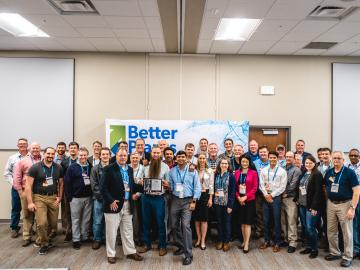
As the United States transitions to clean energy, the country has an ambitious goal: cut carbon dioxide emissions in half by the year 2030, if not before. One of the solutions to help meet this challenge is found at ORNL as part of the Better Plants Program.
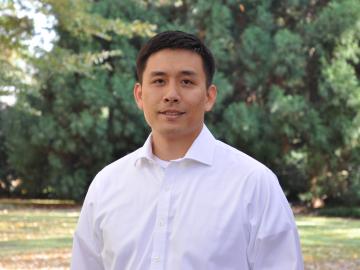
Ross Wang has been intent on resolving traffic jams since he rode a city bus every day through 40 minutes of traffic to get to his elementary school. That daily journey left an impression that would shape his career.
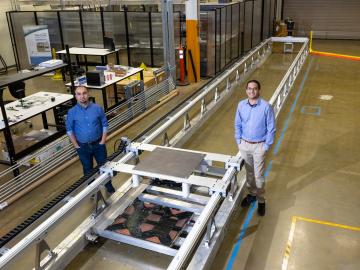
Consumer buy-in is key to the future of a decarbonized transportation sector in which electric vehicles largely replace today’s conventionally fueled cars and trucks.
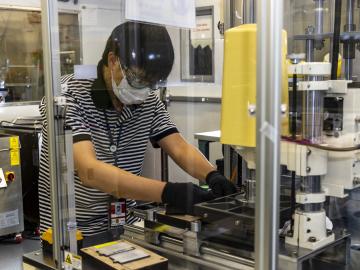
In his career focused on energy storage science, Jianlin Li has learned that discovering new ways to process and assemble batteries is just as important as the development of new materials.

Through a consortium of Department of Energy national laboratories, ORNL scientists are applying their expertise to provide solutions that enable the commercialization of emission-free hydrogen fuel cell technology for heavy-duty

Twenty-seven ORNL researchers Zoomed into 11 middle schools across Tennessee during the annual Engineers Week in February. East Tennessee schools throughout Oak Ridge and Roane, Sevier, Blount and Loudon counties participated, with three West Tennessee schools joining in.
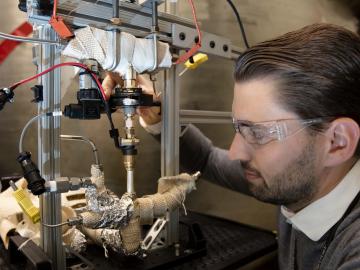
For a researcher who started out in mechanical engineering with a focus on engine combustion, Martin Wissink has learned a lot about neutrons on the job

As ORNL’s fuel properties technical lead for the U.S. Department of Energy’s Co-Optimization of Fuel and Engines, or Co-Optima, initiative, Jim Szybist has been on a quest for the past few years to identify the most significant indicators for predicting how a fuel will perform in engines designed for light-duty vehicles such as passenger cars and pickup trucks.
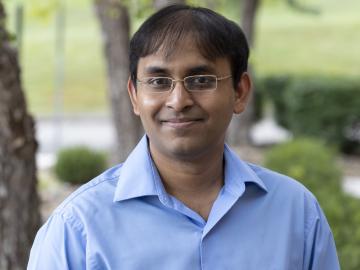
Planning for a digitized, sustainable smart power grid is a challenge to which Suman Debnath is using not only his own applied mathematics expertise, but also the wider communal knowledge made possible by his revival of a local chapter of the IEEE professional society.


